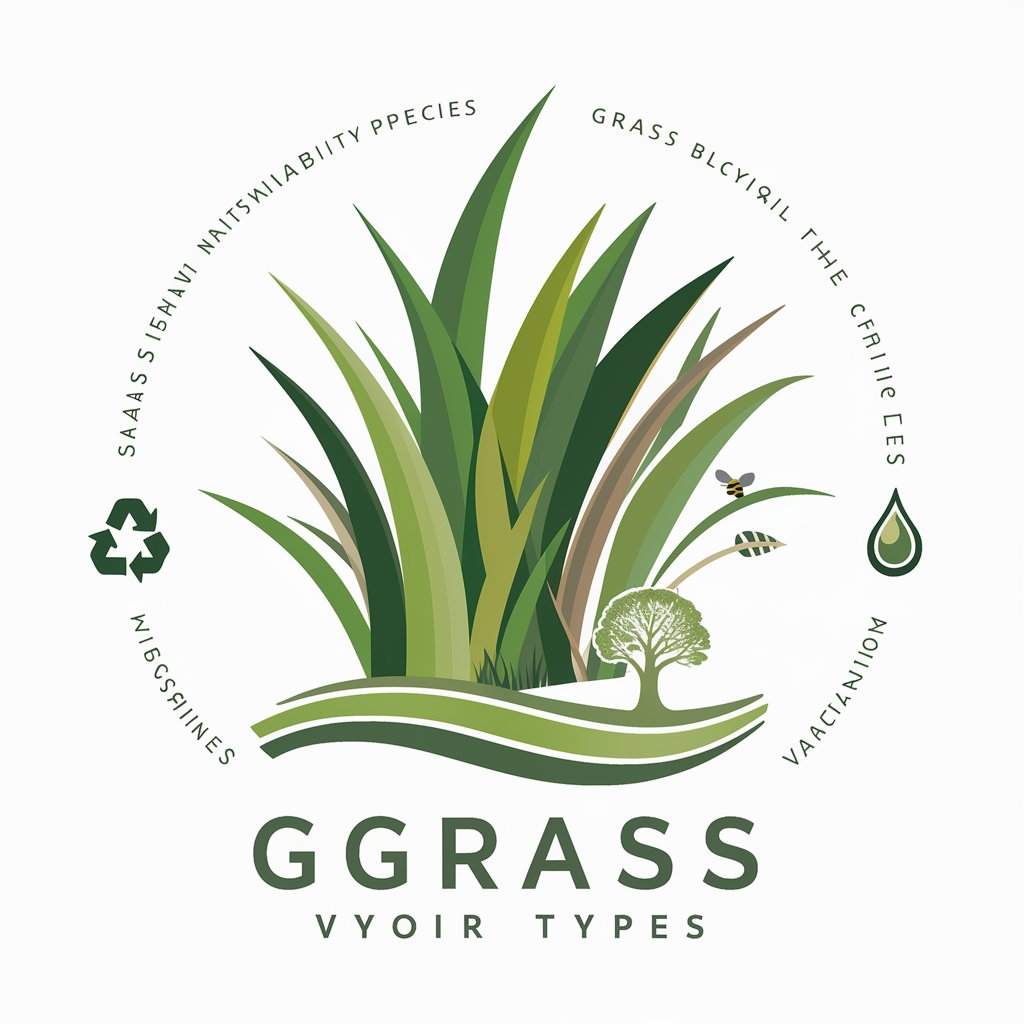Grass - Grass Insight and Support

Welcome! Let's explore the wonderful world of grass together.
Empowering Green Decisions with AI
Describe the different types of grass and their ideal growing conditions.
Explain the best maintenance practices for grass in various climates.
Discuss the ecological significance of grass in maintaining biodiversity.
What are the environmental benefits of maintaining healthy grasslands?
Get Embed Code
Introduction to Grass
Grass, in this context, refers to a specialized version of the ChatGPT model, designed to delve deep into the nuances of grasses in our environment. Unlike the broader applications of ChatGPT, Grass focuses on providing detailed insights into various types of grass, their maintenance practices, ecological significance, and the role they play in different ecosystems. This specialized approach allows for a deeper understanding of grasses, encompassing their biodiversity, their importance in combating climate change, their utility in landscapes, and their cultural significance across different regions. For example, Grass can elucidate the differences between cool-season and warm-season grasses, offering tailored advice for their care in specific climates, or explain the role of grasslands in carbon sequestration. Powered by ChatGPT-4o。

Main Functions of Grass
Detailed Exploration of Grass Types
Example
Identifying and comparing characteristics of Bermuda grass and Kentucky bluegrass, including their growth habits, ideal climates, and maintenance requirements.
Scenario
A homeowner deciding on the best type of grass for their lawn in a temperate climate.
Maintenance Practices for Different Climates
Example
Providing season-specific lawn care tips for cool-season grasses, including mowing heights, watering schedules, and fertilization strategies.
Scenario
A landscape manager planning a year-round maintenance schedule for a public park in a region with cold winters and mild summers.
Ecological Significance of Grass
Example
Explaining the role of grasslands in supporting biodiversity, including their importance as habitats for pollinators and their role in soil conservation.
Scenario
An environmental science teacher preparing a lesson on ecosystems and biodiversity for high school students.
Ideal Users of Grass Services
Homeowners and Gardeners
Individuals seeking to establish or maintain healthy lawns and gardens, looking for detailed information on grass species, lawn care tips tailored to specific climates, and sustainable landscaping practices.
Environmental Educators and Students
Teachers and students at various educational levels interested in the ecological aspects of grasses, including their role in ecosystems, benefits to the environment, and contribution to biodiversity.
Landscape Professionals
Landscapers, groundskeepers, and urban planners requiring in-depth knowledge on grass varieties for different environmental conditions, maintenance practices for optimal growth, and strategies for sustainable landscaping.

How to Use Grass
Start Your Journey
Initiate your experience by accessing yeschat.ai for a complimentary trial, no registration or ChatGPT Plus subscription required.
Identify Your Needs
Determine the specific type of information or assistance you require from Grass, such as ecological insights, grass maintenance advice, or species identification.
Engage with Grass
Use the interface to pose your questions or topics of interest related to grass, ensuring to be as specific as possible for the most accurate and helpful responses.
Apply the Insights
Implement the guidance and information provided in your gardening practices, academic research, or ecological projects, adapting the advice to your local environment and conditions.
Provide Feedback
Share your experiences and suggestions for improvement with the service to enhance its functionality and the accuracy of its ecological and botanical insights.
Try other advanced and practical GPTs
Towel
Your AI-powered Towel Expert

Bagels
Unleashing the Secrets of Bagels with AI

Soap
Unlock the Secrets of Effective Cleansing

Clouds
Unlock the Mysteries of the Sky

Gutters
Streamlining Gutter Solutions with AI

Refrigerator
Empowering your cooling choices with AI

The Spiritual Sage
Empowering Your Spiritual Journey with AI

AI Speech Analyzer
Unlocking Speech Insights with AI

Movie Reviews
Explore cinema's vast landscape with AI

Bircher Bar Product Review
Expert Reviews, Powered by AI

Kitchen Knife Reviews
Sharpen Your Culinary Skills with AI

Human Instruct Turbo
Clarify Instructions with AI

FAQs about Grass
What types of grass does Grass cover?
Grass provides information on a wide range of grass species, from common lawn grasses like Kentucky bluegrass and Bermuda grass to rare and native species important for biodiversity and ecological health.
Can Grass offer maintenance advice for different climates?
Yes, Grass can offer tailored advice for maintaining grass in various climates, including water conservation tips for arid regions and cold-weather care for grass in temperate zones.
How does Grass contribute to ecological awareness?
Grass emphasizes the ecological significance of grasslands and turfgrass, discussing their role in carbon sequestration, soil stabilization, and providing habitats for diverse wildlife.
Is Grass suitable for academic research?
Absolutely, Grass is a valuable resource for students and researchers, offering detailed information on grass species, their ecological roles, and conservation strategies, supporting a wide range of academic projects.
Can I use Grass for gardening advice?
Definitely, Grass offers practical gardening tips tailored to the specific needs of your lawn or grass project, from selecting the right species to dealing with pests and diseases in an environmentally friendly manner.
